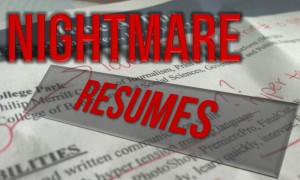Think you have a great resume that will crack open the door to a major news organization and result in a job offer?
Think again.
Many of the traditional approaches to resume writing have changed. For example, recruiters don’t think highly of the home address at the top of a resume — unless you expect to communicate with your prospective new boss through earnest handwritten notes mailed via the U.S. Postal Service.
They also don’t love buzzwords, mission statements and, to state the obvious, typos.
There is an added level of scrutiny on resumes submitted for journalism jobs, especially since candidates will be writing for a living.
“Misspellings, typos or other errors are killers,” said Rob Doherty, general manager, U.S. & Canada, Reuters. “If you can’t get things right in your cover letter or resume, how can we trust you to get a story right?”
Here, in more detail, are tips from recruiters in the news industry on how to write a journalism resume (and what tactics to avoid):
On number of pages?
Doherty: I prefer one page. It tells me what I need to know and, coupled with a strong cover letter, should let me know whether the candidate is a strong one.
Brent Jones, director of standards and staffing administration, USA Today: I find oftentimes that when resumes are lengthy, the candidate didn’t put much thought into the main point she/he was looking to get across with each job example. Lots of redundancies. No clear voice or writing style. Don’t be afraid to edit.
Addresses?
Jones: I think the fixed address shows the applicant is out of touch with how folks communicate in today’s workplace environment. Today’s work world, thanks to technology, is all about immediacy. I recommend to my interns that they drop the address in favor of professional email and website info, cell number and social media contact info, such as a Twitter handle. Even when a job posting is looking for someone local or an HR generalist needs to mail on-boarding information, the address is there for them on the cover letter.
Print vs. digital?
Doherty: I think digital resumes should only be used for certain jobs. If you are applying for a reporting job, for example, I think a print resume still is the way to go. If you are applying for a job that requires digital skills, then a digital resume may allow you to demonstrate those skills in addition to presenting information about your prior experience.
Jones: The nature of digital offers greater opportunity to do so much more. Links to websites and more details about work experience. Video. Interactive graphic elements. All can be a part of the digital resume. And there are ways to enliven print resumes, too. I’ve suggested timeline logos to illustrate work history, for example, as a way to create multiple entry points for telling a career story on a resume page.
Joe Grimm, Michigan State University journalism professor: A digital-age resume should act like a digital resume. It should have a lot of active links to your LinkedIn profile, a relevant Twitter or Instagram account if you have them, your portfolio or published work and your email. A web page with no links is essentially a dead end, and so is a linkless digital resume. When you make a digital resume, use content links rather than a bunch of ugly URLs.
Intro or mission statement?
Doherty: It wouldn’t influence me either way. I will be more interested in the substance of the resume. If you have the experience we are looking for, that should be clear from your resume. If you don’t, all the bells and whistles won’t make a difference.
Jones: I don’t have strong feelings about them, but I do think that the body of the resume – coupled with a great cover letter — should be telling enough to figure out the applicant’s mission.
Grimm: An intro or mission statement is seldom needed. If it is not good, it will be the first and last thing a hiring manager reads. I would make an exception for career switchers: “After 15 years trying to improve education as a teacher, I want to take the skills I have learned freelancing stories and videos into a job as an education reporter.”
Accomplishment-based resumes? Bullet points, prose, buzzwords?
Jones: I’ve seen effective use on each style consideration. What’s most important is being mindful of the reader’s time, so write succinctly, avoid redundancies as much as possible, and remember to tie in how you made a difference with each job highlight.
Doherty: Either bullet points or prose can be effective. Definitely stay away from buzzwords.
Grimm: Avoid buzzwords as you would avoid cliches. They are not buzzwords, but zzz words. If you are looking for a job where writing is important, show you can write. Even the lowly sentence, clear, concise and with a solid verb will do a better job of selling your work than a list of bullet points.
Worst resume you’ve ever seen?
Jones: I cringe when I see typos on a resume. Once, someone forgot to include contact info. … Take time to proofread. Also, for a fresh perspective, I strongly recommend you have someone else read over the resume and cover letter. And always print out and review what you plan to send. Not every electronic version of a resume translates well on a printed page.
Related story: “12 Hilarious (And Unbelievable) Journalism Job Resume Mistakes”
Clean up my social media accounts?
Jones: Checking out a person’s social media presence is pretty common, whether vetting a possible hire or just for talent pipeline purposes. I tend to stick to more professional sites, such as Twitter and LinkedIn. I also may be guided in my search based on stories written about the candidate or information the candidate has shared online.
Doherty: I generally don’t pay much attention to a candidate’s social presence unless it is relevant to the job they are seeking. That said, it’s a mistake to have anything embarrassing on your Facebook page for all to see. That can only hurt you.


![resume[1]](/wp-content/uploads/2014/04/resume1.jpg)






Leave a Comment